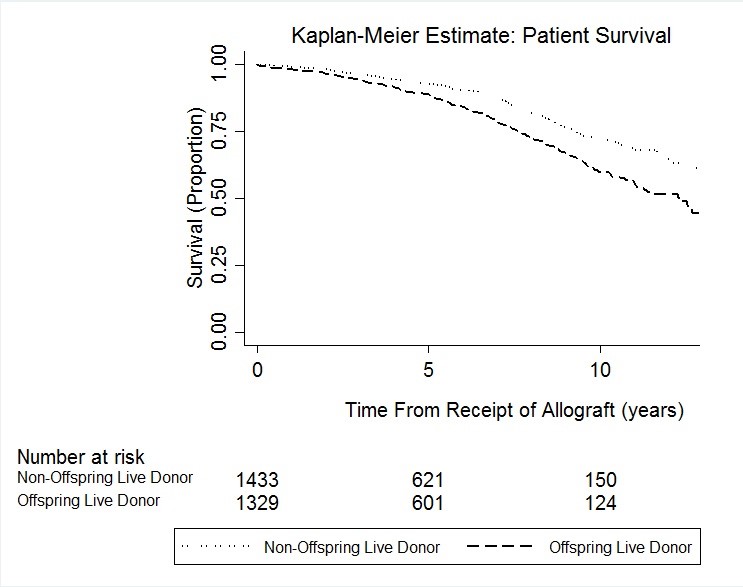Immune Sensitization During Pregnancy Reduces Long-Term Benefit for Kidney Recipients of Offspring Living Donors.
1Medicine, University of Pennyslvania, Philadelphia, PA
2Surgery, University of Pennsylvania, Philadelphia, PA
Meeting: 2017 American Transplant Congress
Abstract number: 531
Keywords: Graft survival, Kidney transplantation, Pregnancy
Session Information
Session Name: Concurrent Session: Long Term Kidney Graft Survival II
Session Type: Concurrent Session
Date: Tuesday, May 2, 2017
Session Time: 4:30pm-6:00pm
 Presentation Time: 4:42pm-4:54pm
Presentation Time: 4:42pm-4:54pm
Location: E450a
Background Offspring-to-mother kidney transplantations are associated with excellent short-term outcomes given the accuracy of histocompatibility testing and potency of immunosuppression. However, immunologic memory responses in women immunized by prior pregnancy may threaten the long-term success of these transplants. We aimed to determine the impact of pregnancy immune sensitization on long-term outcomes of recipients of offspring living donor (LD) kidneys. Methods We retrospectively analyzed UNOS data (2001-2015) to determine the hazard of mortality and allograft failure in women who received an offspring kidney versus recipients of other 3 antigen-matched LD kidneys. The study cohort consisted of female LD kidney recipients ≥ 36 years old with a 0% PRA and 3 HLA matches. Results 2,767 patients met inclusion criteria, 1,332 (48%) of whom received a kidney from an offspring LD. Median recipient age was 55 years (IQR 47-62), 19% were African American, 33% were diabetic, and median dialysis vintage was 232 days (IQR 0-631). Using multivariable Cox proportional hazards modeling to account for important donor and recipient characteristics (i.e. age, race, BMI, diabetes, immunosuppression, and sensitization history), we found that women who received a kidney from an offspring LD had an increased hazard of mortality (HR 1.62, 95%CI 1.08-2.44, p = 0.02) and all-cause allograft failure (HR 1.66, 95%CI 1.16-2.38, p = 0.01) compared to women who received a kidney from a comparably HLA-matched, non-offspring LD. Conclusion Re-exposure through transplantation to tissue antigens that were initially encountered in pregnancy is associated with long-term risk. Non-offspring living donors should be considered whenever feasible for female patients with multiple donor options. 

CITATION INFORMATION: Cohen J, Owei L, Sawinski D, Porrett P. Immune Sensitization During Pregnancy Reduces Long-Term Benefit for Kidney Recipients of Offspring Living Donors. Am J Transplant. 2017;17 (suppl 3).
To cite this abstract in AMA style:
Cohen J, Owei L, Sawinski D, Porrett P. Immune Sensitization During Pregnancy Reduces Long-Term Benefit for Kidney Recipients of Offspring Living Donors. [abstract]. Am J Transplant. 2017; 17 (suppl 3). https://atcmeetingabstracts.com/abstract/immune-sensitization-during-pregnancy-reduces-long-term-benefit-for-kidney-recipients-of-offspring-living-donors/. Accessed February 21, 2026.« Back to 2017 American Transplant Congress
